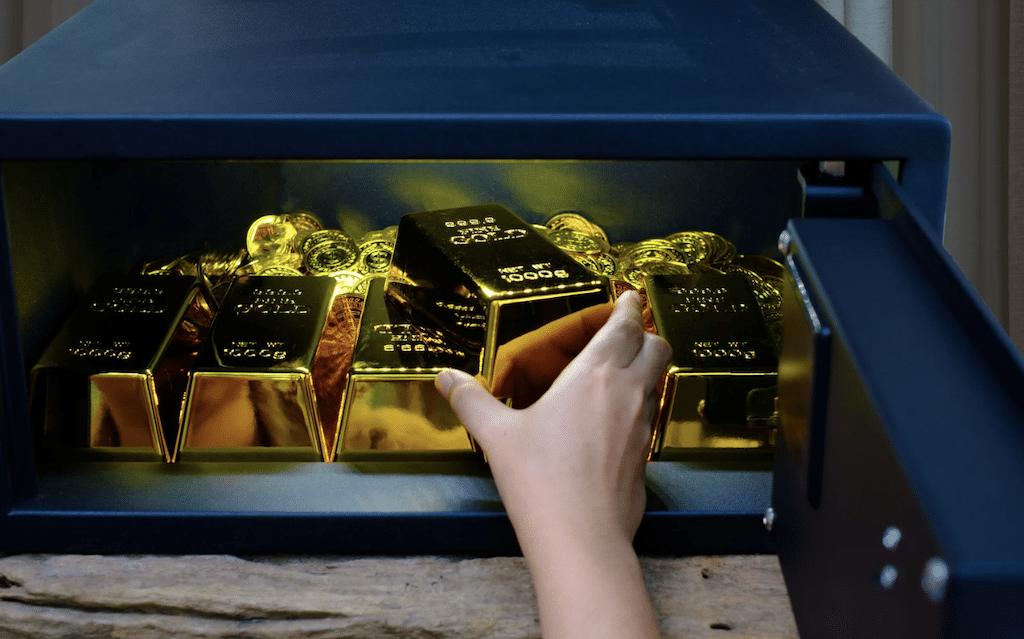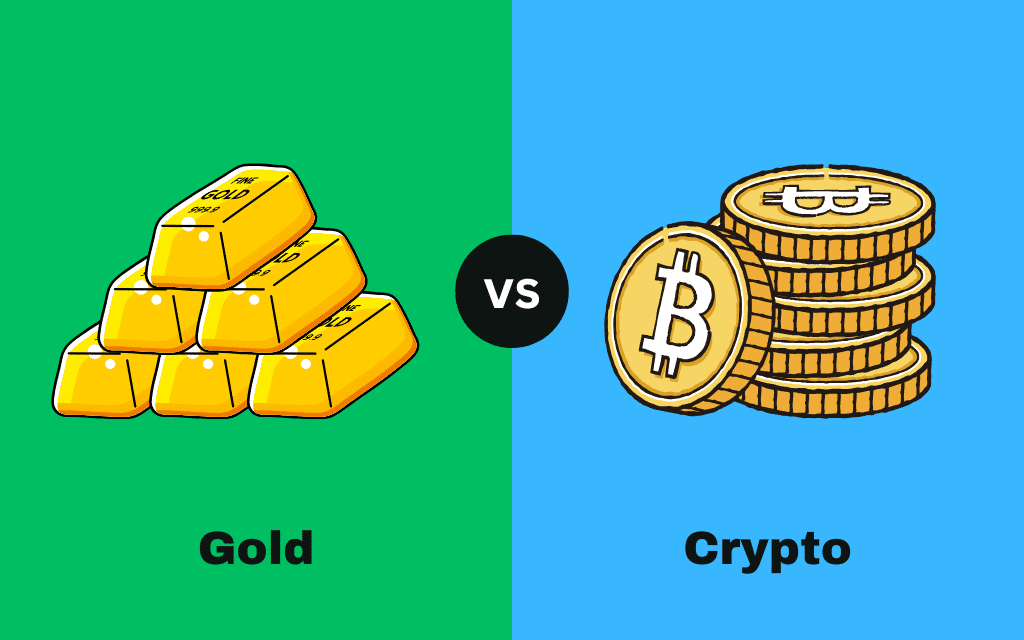Key Takeaways
- Home storage of gold held in an IRA is illegal under IRS rules.
- All gold IRA assets must be held by an IRS-approved custodian or depository.
- Storing IRA gold at home is treated as a taxable distribution with potential penalties.
- Segregated storage offers individual ownership of gold, but comes with higher fees.
A home storage gold IRA might sound convenient, but it’s more complicated than most investors realize.
The concept of a “home storage IRA” is often promoted as a way to store gold at home within a self-directed IRA, but it comes with significant legal and compliance considerations.
There are specific IRS requirements for an individual retirement account that prohibit storing IRA gold at home.
It is important to follow these requirements and use IRS-approved custodians. Instead of storing your gold at home, there are other alternatives you can consider.
Here’s what you need to know before investing.
What is a home storage gold IRA?
Some companies promote something called a “home storage gold IRA”—a type of self-directed IRA that claims you can keep IRS-approved gold in a home safe.
But here’s the truth: The IRS does not allow you to store gold from an IRA at home.
What the IRS Requires
Even though home storage IRAs are advertised as giving you more control, IRS rules say your gold must be held by an approved trustee or depository—not in your personal safe or at your house.
Some investors look into a “checkbook IRA” setup, which involves creating an LLC to manage their IRA assets more directly.
But this method can lead to legal and tax risks if not done exactly right.
What can you invest in with a self-directed IRA?
A self-directed IRA still gives you more freedom than a traditional IRA. You can invest in:
- Precious metals like gold and silver
- Real estate
- Private companies or equity
But even with that flexibility, you still need to follow IRS rules, especially when it comes to storing physical assets like gold.
Bottom line: While a home storage gold IRA may sound appealing, it’s not allowed under current IRS guidelines. To protect your retirement savings and stay compliant, make sure your gold is stored in an IRS-approved depository through a qualified custodian.
Can I take physical possession of gold in my IRA?
While you can own physical gold or other physical precious metals inside of a self-directed IRA, the IRS requires these assets to be stored with an approved, third-party depository if they’re going to qualify as part of your IRA.
You can’t store gold or other physical precious metals in a safe at home while also claiming tax benefits on them.
If you take physical possession of IRA-purchased gold or other physical precious metals yourself – even if it’s temporary – it’s considered a distribution.
You’ll pay income taxes on the distribution and for investors who withdraw before reaching retirement under age 59 ½, you’ll be hit with a 10% early withdrawal penalty.
Additionally, taking physical possession at home can jeopardize the entire IRA, resulting in the loss of its tax-free or tax-deferred status and triggering significant tax penalties.
Why an IRA Custodian is Key to Managing Your Gold IRA
If you’re opening a gold IRA, choosing the right IRA custodian is one of the most important steps.
An IRA custodian is a financial institution or trust company approved by the IRS.
Their job is to hold and protect your retirement assets, including physical gold and other precious metals.
What Does a Custodian Do?
- Keeps your account IRS-compliant from start to finish
- Makes sure the gold you buy meets IRS purity standards
- Oversees secure storage at facilities like the Delaware Depository
- Ensures your metals are properly insured
- Handles all paperwork, reporting, and tax documentation to keep your IRA in good standing
By working with a qualified, IRS-approved custodian, you reduce your risk of penalties and help ensure your gold IRA stays tax-advantaged.
Why It Matters for Your Retirement
A reliable custodian helps you:
- Protect your retirement savings
- Avoid IRS mistakes or rule violations
- Enjoy peace of mind knowing your gold is stored safely and legally
Choosing the right IRA custodian isn’t just a formality—it’s a smart move to protect your assets and secure your financial future.
Alternatives to Home Storage Gold IRAs
If you want to invest in gold, but don’t want to be non-compliant with IRS rules, here are three safer and more practical alternatives to home storage gold IRAs.
Self storage of gold at home is risky and does not comply with IRS regulations. While some assets, such as paper currencies, can be stored at home or in a bank safe, gold held in an IRA must follow stricter rules.
Alternatively, you can hold gold outside of an IRA, but it is crucial to choose a secure location—such as a bank safety deposit box or a secure vault—to protect your assets.
Self-directed IRAs
A self-directed IRA lets you hold physical gold and other metals in an IRS-approved custodian and depository.
The depository securely stores the physical metal on behalf of the IRA, ensuring compliance with IRS regulations.
You still get the same tax advantages for your retirement savings while complying with federal rules.
This is the most common way to hold physical gold in your portfolio.
Some popular custodians include:
- Equity Trust Company
- STRATA Trust Company
- GoldStar Trust Company
- Madison Trust Company
- The Entrust Group
These custodians safeguard a range of IRA assets, including gold, precious metals, and other approved investments.
Some respected depositories include:
- Delaware Depository
- Brink’s Global Services
- International Depository Services
- A-M Global Logistics
- Texas Precious Metals Depository
Buy gold directly
You can still buy gold and store it at home, but this method of owning gold is outside of a retirement account, so you won’t be able to claim any of the tax benefits that come with an IRA.
Buying gold directly gives you full control and instant access to it without worrying about paying a custodian and depository to hold your gold for you.
Keep in mind that you’ll have to buy your gold with after-tax dollars. You’ll also be responsible for insuring your physical precious metals and making sure you have the right home storage solution to keep them safe.
Buy gold stocks or ETFs
Physical gold isn’t the only way to invest in gold. You can also invest in gold mining stocks and gold-backed ETFs.
Mutual funds focused on gold or precious metals are another alternative for investors seeking exposure to gold without owning physical gold.
These are easier to manage and can be held in a traditional brokerage or retirement account. They offer exposure to the price of gold, but you won’t have to deal with storage or insurance.
Some popular gold stocks and ETFs include:
- SPDR Gold Shares (GLD)
- iShares Gold Trust (IAU)
- Newmont Corporation (NEM)
- Barrick Gold Corporation (GOLD)
- Franco-Nevada Corporation (FNV)
Gold IRA Requirements
Before you can invest in a gold IRA, there are several requirements you’ll need to meet. These rules are set by the IRS to ensure compliance and proper management of retirement accounts.
It’s important to note that a home storage IRA, where you hold physical metals at home, is not compliant with IRS requirements and can result in penalties.
To be compliant you must:
- Invest in IRA-eligible gold. Not all gold qualifies for inclusion in a gold IRA. Coins and bars must meet a minimum purity of 99.5% (with a few exceptions like the American Gold Eagle) and must be produced by an approved refiner or government mint.
- Set up your gold IRA with an approved custodian. You can’t hold a gold IRA on your own. You must open the account through an IRS-approved custodian who handles administration, reporting, and compliance. Some investors consider alternative structures like a checkbook IRA, which allows more direct control, but these come with additional legal and compliance risks.
- Store your gold with an approved depository. The physical gold must be stored in an IRS-approved depository. You cannot store it at home or in a personal safe without risking disqualification and penalties.
- Set up a self-directed IRA. You’ll need to open this type of account to include physical gold in your retirement portfolio. Self-directed IRAs offer a broader range of investments allowed, such as precious metals, real estate, and private equity, but all assets must meet IRS regulations.
- Stick to IRS contribution limits. Your gold IRA shares the same contribution limits as other IRAs. For 2025, you can contribute up to $7,000 if you’re under 50, or $8,000 if you’re 50 or older.
- Avoid prohibited transactions. You (or certain family members) can’t use the gold in personal transactions. You can’t borrow against it, sell it to yourself, or use it for personal gain.
How to a Set Up Gold IRA (legally)
To set up a gold IRA, follow these steps:
- Find a custodian. Select an IRS-approved custodian that specializes in self-directed IRAs. They’ll handle the paperwork, tax reporting, and ensure your account stays compliant.
- Open an account. Work with your custodian to open a self-directed IRA account. This type of IRA allows you to invest in alternative assets like gold.
- Fund your account. You can do this by rolling over funds from an existing IRA or 401(k); transferring funds from another gold IRA; or making a direct contribution.
- Choose IRS-approved gold. Choose a reputable dealer who offers IRA-eligible gold. Your custodian may have recommended partners they work with, but you can also shop around. Look at the premiums, fees, buyback policies, and customer service reputation of different gold dealers.
- Arrange for storage. Once you select your gold, it must be shipped directly to an IRS-approved depository. Your custodian will help facilitate secure delivery and storage.
- Monitor and manage your investment. After your gold is safely stored, you can monitor your account through your custodian’s portal. Proper setup and compliance help maintain the tax-free or tax-deferred status of your gold IRA. You can track your investment but keep in mind you’ll be subject to taxes and penalties if you take a distribution before you retire.
Why a home storage gold IRA is a bad idea?
Storing gold at home may sound convenient—but when it comes to a gold IRA, it’s usually not a good idea.
IRS rules are strict
The IRS has very specific rules for gold IRAs. If you don’t follow them exactly, you could face:
- Taxes and penalties
- Disqualification of your entire IRA
- Loss of your retirement savings protections
Some companies promote “home storage gold IRAs” that involve keeping physical gold in your house. But these setups often don’t meet IRS rules.
If your gold isn’t stored properly, the IRS may treat your gold IRA as a fully distributed account, triggering big tax bills and penalties.
A Safer Way to Invest in Gold
If you want to hold gold in your retirement plan, the safest option is to open a self-directed IRA with an IRS-approved custodian. Your metals will be stored in a secure, IRS-compliant depository.
Other options include:
- Buying physical gold outright (without tax advantages)
- Buying gold ETFs through a traditional brokerage IRA
What to Do Next
To get started, compare IRA custodians and talk to a reputable gold dealer. You can also speak with a financial advisor to learn how gold can help diversify your retirement savings safely.






